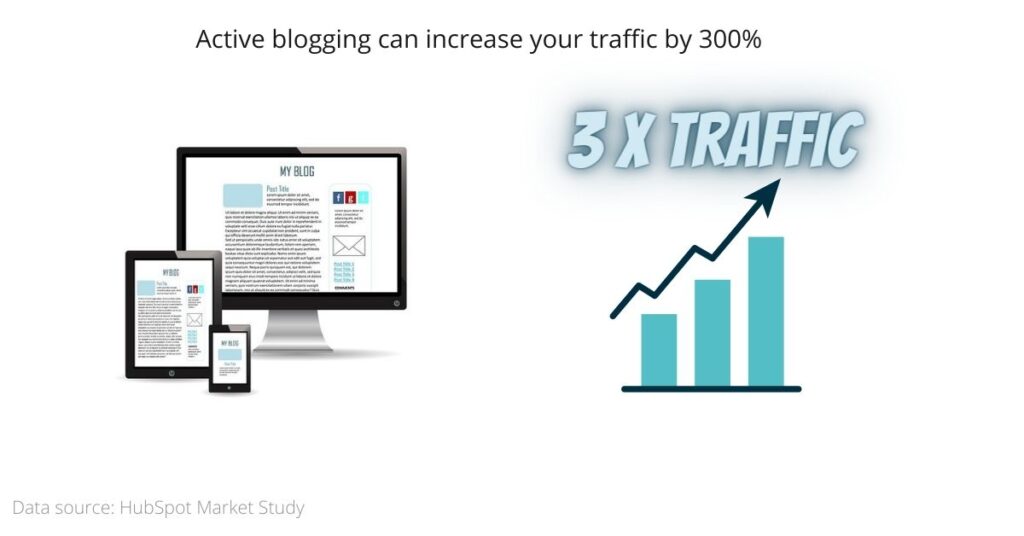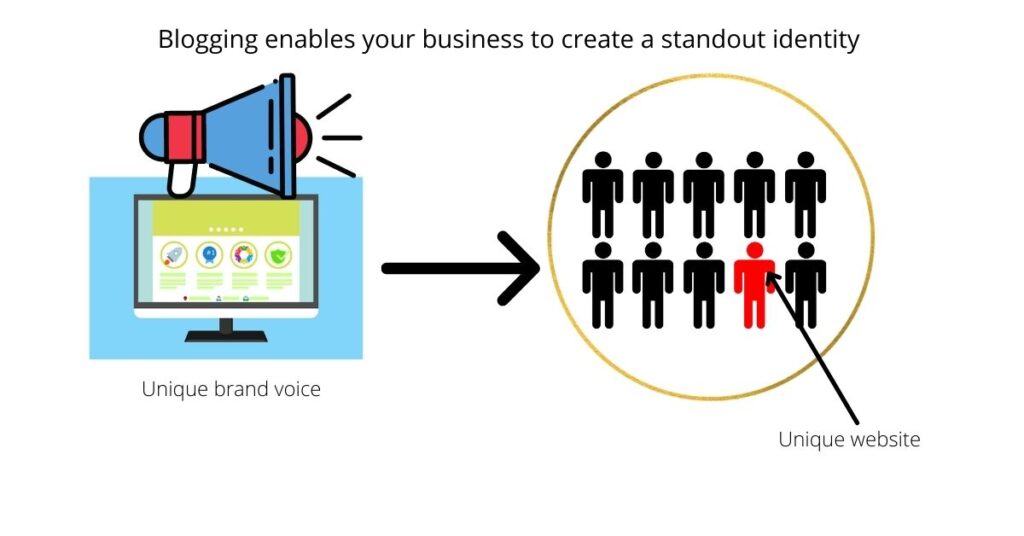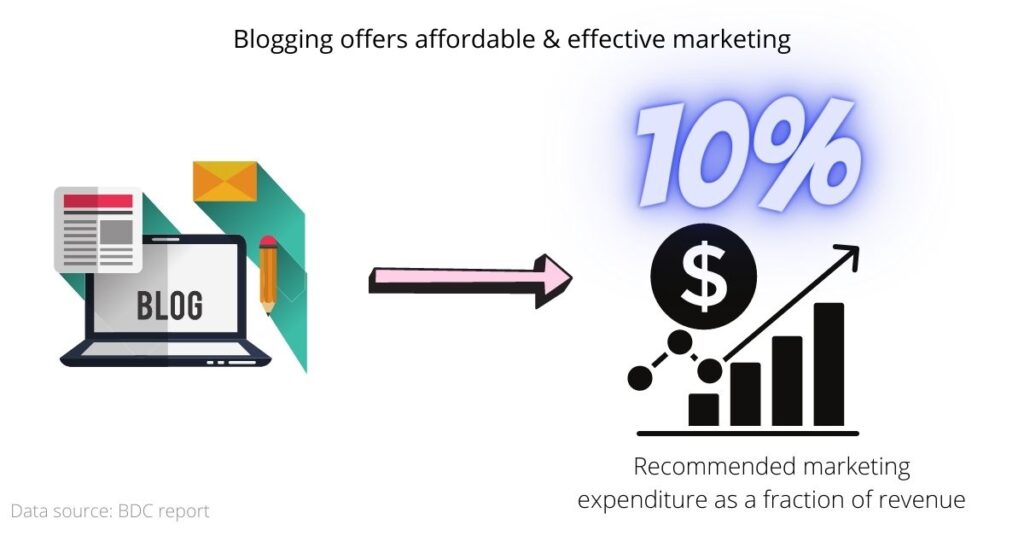Does your business have an active blog?
You’ve created that amazing website, and are pumped up about turning some heads and shepherding some of that online traffic your way. However, after a while, things simply aren’t looking up.
Website traffic has leveled out, and you’re scratching your head about how to make it go back up again.
SEO-friendly blogging has helped many websites increase engagement and traffic, and it could do the same for your business.
For tips on how to write SEO-friendly blog posts, you should also take a look at this other article I wrote on SEO best practices for high ranking small business blogs. Quality content beats frequency all the time, and this article has useful tips to improve your blog.
That said, why should you prioritize an active business blog?
In this article, we’ll be discussing 5 powerful benefits of blogging for your small business.
Let’s get started.
1. It Increases Traffic to Your Website
Are you satisfied with your website traffic?
I’ll go out on a limb here and say that even if you’re seeing some results, you’d love it if traffic was higher.
Low traffic translates to a smaller blog audience, which means it’ll also be slim pickings when it comes to generating leads for your services or products.
At the end of the day, if your website is not generating the traffic you want or need, it beats the purpose of having it.
One way to boost traffic is by frequent SEO-friendly blogging.
According to a 2020 HubSpot market study, an active blog can increase your traffic by over three times.

Active blogging here means about 17 blog posts per month compared to a monthly blog turnover of 4 articles, which is considered as the reference for the above statistic.
When you regularly churn out SEO-friendly blogs, you increase the frequency of indexing from web crawlers or search engine algorithms.
Indexing simply refers to how web crawlers arrange search results in readiness for a specific keyword search.
In other words, the more content you produce the more these algorithms go through your website, and the more chances you have to impress.
With every fresh content, web crawlers reassess your position in the queue or index.
If the content is of great quality and is well optimized, your search engine ranking gets bumped up with each update.
2. It Helps Grow Your Brand Identity
Does your brand have a voice?
What do I even mean by brand voice?
How you relate with customers, and how they perceive your business e.g. jovial, funky, professional, etc., is what is known as brand voice. Alternatively, it refers to your writing persona or style of communication.
If your brand lacks a clear voice or sounds as generic as most others, your blog posts will get lost in the crowd. There will be nothing memorable or outstanding about your content, and therefore readers are unlikely to share the post or come back for more.
With poor memorability also comes the reduced chances of creating viral content, and generating more attention for your blog.

The benefits of blogging for small businesses include the opportunities to create a consistent tone of voice. As a result, you can increase familiarity with your audience and break those professional barriers that often stand between businesses and customers.
According to an Oberlo market study, 60% of consumers say unique content influences how they buy products, and that they’re likely to buy from companies with an inviting persona.
When your business feels more like a trusted friend than a faceless corporation, customers can turn to you for a few words of wisdom, and for any product or service needs they may have.
It’s a win-win for both you and your market, no matter if you have a B2C or B2B model. In the latter case, however, a professional tone is often ideal.
3. It Builds Brand Authority and Trust
Did you know that over half of leads don’t trust brands?
This is according to a BOP Design market study which states that 54% of your market have no faith in small businesses.
When most of your audiences don’t have confidence in your brand, it becomes hard to reel them in for conversions because people are already unreceptive toward you.
Infrequent or unhelpful blogging is among the top reasons why customer trust is hard to come by, because the more you put out practically helpful content, the more you can establish your business as a strong industry player.
Consequently, the more people get to trust not only what you say but what you sell as well.
By blogging tailored towards your audience’s problems, you can increase brand authority.

Authoritative blogging is cultivated by consistently tackling issues affecting your market base. By continually providing practical answers to their pressing needs or questions, customers start to see your business as a beacon of expertise.
Additionally, search engines carry out a significant amount of curation to get users the answers they need. With authoritative blogging, you’ll be offering answers to these search queries, and if Google finds these answers consistently useful, you’ll rank higher.
Higher SERP ranking comes with the belief that you’re in that position for a good reason.
That reason being that you are well-versed with search topics, which means your products or services also come from a point of expertise and can be trusted.
4. It Offers Long Term Marketing Results
What is the size of your marketing budget?
The Business Development Bank of Canada recommends that your marketing expenses shouldn’t cost more than 10% of your revenue.
However, that’s often easier said than done because you may be tempted, as is often the case especially with new startups, to go all in to hit the ground running. But that doesn’t always work out as planned, and you may end up spending too much too fast.
Alternatively, as a small business owner, you may not even have the biggest marketing budget to work with in the first place.
Therefore, there’s a priority for inexpensive but effective marketing, which is yet another one of the many benefits of blogging for your small business.

Content marketing is one of the most affordable strategies of digital marketing today.
If you don’t have a blog or a professional website on which to blog, you should check out this article on how a professional website grows your small business.
Blogging offers recurring marketing for your brand as opposed to other marketing strategies, which tend to be a lot more hands-on and short-term across the marketing cycle.
A single, tactically written blog post continually generates traffic via a compounding concept, according to research by HubSpot, contributing to over 38% of the total traffic you receive.
You can rely on the same posts to continually attract interest for the long haul, although regularly updating your content does have its benefits as well.
5. It Increases Customer Interaction and Engagement
Customer engagement is often a one-way affair for some businesses.
To substantiate just how a big deal customer engagement is, a global research study by Salesforce paints us a dire picture.
It establishes that 54% of customers are not completely satisfied with how businesses interact with them. In other words, that means over half of your market feels left out.
So how can you improve your reader engagement?
The answer is as simple as interactive blogging.
But you don’t need to get all worked up about what that is. Interactive blogging entails writing content with shareability features and leaving channels for your readers to speak their minds. An example of such a channel is a post-article comment box.

Blogging also increases engagement in other ways.
For example, with a steady flow of “how-to” articles and tutorials encouraging readers to take action and try out your product or an experience for themselves, you can get your customers more invested in your content.
What’s more, if you have some exciting news to share about your business, an informative blog always trumps a superficial press release or announcement email. A blog allows you to hold in-depth discussions and get your fanbase just as revved up as you are about a product launch.
Another benefit of blogging for small businesses is that you can even do a piece around your loyal clients. When returning readers are swayed by real-life examples and customer stories, engagement and conversions tend to go up as well.
Conclusion
How often do you update your small business blog?
I get it.
You may be aware of the vital benefits of blogging for small businesses. However, juggling multiple roles is common for small business owners, and that means you might not have as much time as you’d like for content marketing.
While I understand that, the harsh reality is that customers expect more from you.
According to a report by TechJury, 77% of internet users read blogs. So if you’re not blogging too often, your business is missing out on lots of opportunities to generate leads and grow your brand.
Even worse, without regular content, your loyal customers get distracted by other businesses with a more active content strategy.
If you might need to outsource your content marketing needs, we offer affordable services guaranteed to grow your audience and get customers talking.
Click here to talk to our content marketing experts.





